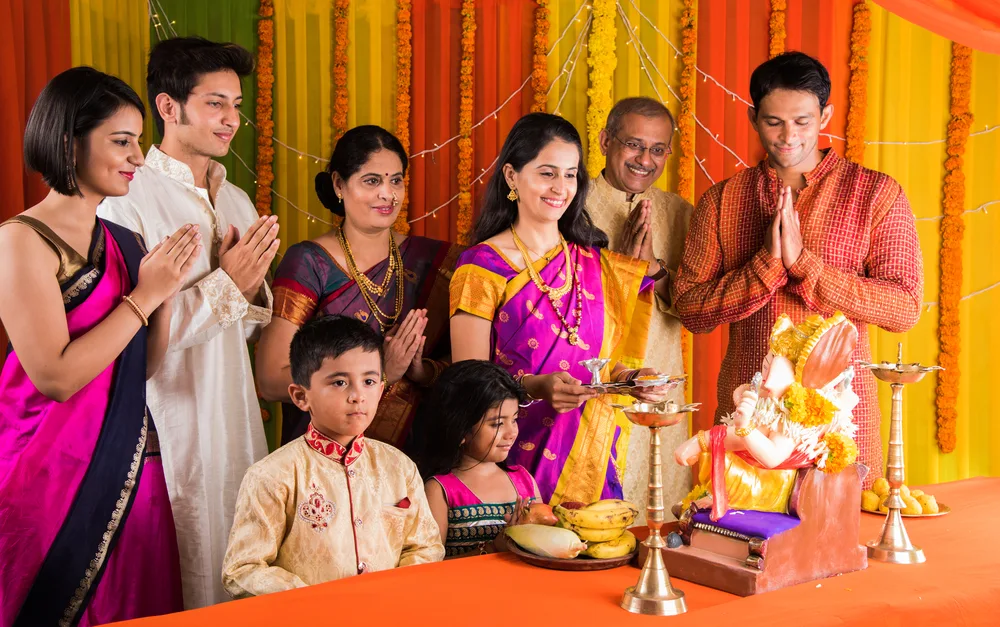The basic building block of Hindu society is the joint or extended family, usually consisting of three of four generations living together. The women collectively cook and share domestic responsibilities, and the men provide the pooled income. Elders take important decisions and, based on their own experience in life, offer guidance to younger members. Within the family, property usually passes from father to son, and men make many of the decisions, though older ladies carry considerable influence. When women marry, they usually join their husband's family, though maintaining contact with their own.
Hindu families demonstrate firm ties of affection, strikingly different from many Western families. Hindu scripture has elaborately defined the dynamics of the various relationships within families. For example, a grandchild can tease and joke with a grandparent in a familiar way, not permissible with the father or mother. The different relatives are given specific terms of address, unlike the west where "aunt" or "uncle" refers to a whole host of relatives and family friends (see below).
The extended family traditionally provides shelter and support for the elderly, the disabled and the less well off. Children are expected to repay the debt owed to their parents by supporting them in their retirement and old age. An important aspect of Hindu family life is the inter-dependence between members. Marriage itself is a broad social and religious obligation, rather than just a relationship between partners. The extended family provides considerable practical and emotional support, as for example when children are born. One advantage is that marriage stability is not inordinately reliant on the state of the couple's emotional ties.
Despite these possible benefits, social trends indicate that the extended family is becoming less popular, especially outside India.Young couples often value the freedom that the nuclear family offers. They are also adopting other aspects of the Western lifestyle. TV is becoming more popular than worship, and is certainly strongly influencing family values.
Family Relationships
Family position | Name (Hindi) |
| Paternal grandfather | Dada |
| Paternal grandmother | Dadi |
| Maternal grandfather | Nana |
| Maternal grandmother | Nani |
| Father | Bap, Pita |
| Mother | Ma, Mata |
| Brother | Bhai, Bhaya |
| Sister | Didi, Bhen |
| Father's brother | Chacha |
| Father's brother's wife | Chachi |
| Mother's brother | Mama |
| Mother's brother's wife | Mami |
| Mother's sister | Mausi, Massi |
| Mother's sister's husband | Mausa |
| Father's sister | Phuphi |
| Father's sister's husband | Phua, Bhua |
Also Read:
 What is Womens Vedic Dharma
What is Womens Vedic Dharma Women Social Issues
Women Social Issues Hindu society joint or extended family
Hindu society joint or extended family How to learn to Respect a Man
How to learn to Respect a Man 25 Responsibilities of Women
25 Responsibilities of Women Decorations for Happiness Women
Decorations for Happiness Women Wearing bangle-increases blood circulation
Wearing bangle-increases blood circulation What is Seven Vows (Saptapadi) of Vedic Marriage
What is Seven Vows (Saptapadi) of Vedic Marriage Scientific Significance of Hindu Women Bangles
Scientific Significance of Hindu Women Bangles Sati - Does woman die on husband's pyre?
Sati - Does woman die on husband's pyre? 10 Elements in Vedic (Hindu) Wedding
10 Elements in Vedic (Hindu) Wedding Scientific Significance of Henna Mehendi
Scientific Significance of Henna Mehendi Scientific Singnificance of Toe Ring in Vedic Tradition
Scientific Singnificance of Toe Ring in Vedic Tradition Women in Hinduism, looks lyk all in one
Women in Hinduism, looks lyk all in one India’s women Hindu ‘sadhvis’ form all-female group
India’s women Hindu ‘sadhvis’ form all-female group Let’s all follow the fundamentals of Hindu Dharma
Let’s all follow the fundamentals of Hindu Dharma TANTRA - the female sexual cycle
TANTRA - the female sexual cycle









